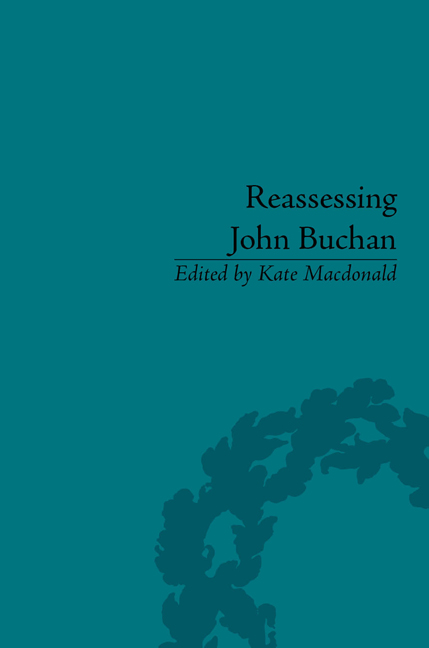Book contents
- Frontmatter
- CONTENTS
- List of contributors
- Introduction
- I Cultural Roots
- II Divided Loyalties
- 6 John Buchan and the South African War
- 7 John Buchan and the First World War: Fact into Fiction
- 8 Buchan and the Pacifists
- 9 John Buchan, America and the ‘British World’, 1904–40
- 10 Islam and the East in John Buchan's Novels
- 11 Conquistadors: Buchan's Businessmen
- III Literary Art
- Notes
- Works Cited
- Index
7 - John Buchan and the First World War: Fact into Fiction
from II - Divided Loyalties
- Frontmatter
- CONTENTS
- List of contributors
- Introduction
- I Cultural Roots
- II Divided Loyalties
- 6 John Buchan and the South African War
- 7 John Buchan and the First World War: Fact into Fiction
- 8 Buchan and the Pacifists
- 9 John Buchan, America and the ‘British World’, 1904–40
- 10 Islam and the East in John Buchan's Novels
- 11 Conquistadors: Buchan's Businessmen
- III Literary Art
- Notes
- Works Cited
- Index
Summary
On 7 January 1917 the British prime minister, David Lloyd George, had a brief meeting with the new French commander-in-chief, Robert Nivelle. He was told of a plan to break through on the Western Front and achieve victory in forty-eight hours. John Buchan described the meeting at the Gare du Nord as decisive:
Mr Lloyd George heard of Nivelle's plan – limitless objectives, the end of trench fighting, victory within two days – and naturally fell in love with it.
Lloyd George had backed the wrong horse. The Nivelle offensive failed, and that summer half of the French army would be wracked by mutiny.
In 1933, Lloyd George had his revenge on Buchan's version of events:
When a brilliant novelist assumes the unaccustomed rôle of a historian it is inevitable that he should now and again forget that he is no longer writing fiction, but that he is engaged on a literary enterprise whose narration is limited in its scope by the rigid bounds of fact … Three fundamental inaccuracies in a single sentence are not a bad achievement even for a writer who has won fame by inventing his facts. The real explanation is that Mr Buchan found it so much less trouble to repeat War Office gossip than to read War Office documents.
Lloyd George's accusations have, as was often the case, a mote and beam quality about them. His own account of the battle of Passchendaele was described by the official historian of the war as ‘entirely fictitious’. However, his response to Buchan's account of the Nivelle affair raises three important issues. Two – the relationship between Lloyd George and John Buchan, and the former's presumption that the latter had access to War Office documents – will be returned to later. The third is more immediate: the idea that John Buchan was a novelist posing as a historian.
- Type
- Chapter
- Information
- Reassessing John BuchanBeyond the Thirty Nine Steps, pp. 77 - 90Publisher: Pickering & ChattoFirst published in: 2014



